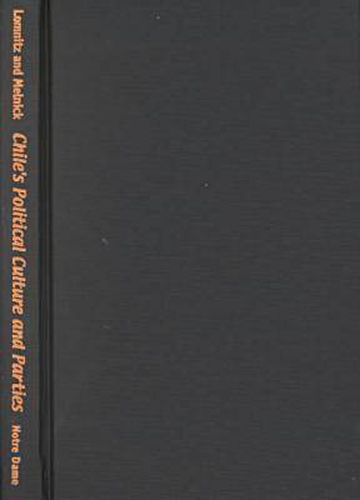Readings Newsletter
Become a Readings Member to make your shopping experience even easier.
Sign in or sign up for free!
You’re not far away from qualifying for FREE standard shipping within Australia
You’ve qualified for FREE standard shipping within Australia
The cart is loading…






The concept of political culture is young-born from the need to explain the dramatic sociological and political changes that occurred in Europe both during and after the Second World War. The practice of examining the culture of political parties in depth through an ethnographic field study of a country’s social structure is, so far, a neglected one. Larissa Adler Lomnitz and Ana Melnick rectify the lack of attention to this area with respect to Chile in Chile’s Political Culture and Parties: An Anthropological Explanation. This volume examines Chile’s political culture by considering its origin and the persistence of its grammar, which the authors define as the ability of each member of society to function within social categories and rules. This grammar, they believe, is what gives character to national culture. Lomnitz and Melnick argue that political parties in Chile are a conglomeration of horizontal networks of friends. Class is perfectly established within Chile’s social tissue, and is defined by a mixture of variables, including an individual’s position in the economy, social network, religious beliefs, and life-style choices. The existence of social class creates subcultural layers in society, and these subcultures create a horizontally organized, class-structured, hierarchial society. In a political system such as this, characterized by its ability to contain strong political subcultures, it is crucial to guarantee the coexistence of these subcultures through the acceptance of a common legal framework, or constitution. Respect for this constitution legitimizes the system and, therefore, legitimizes presidential authority. This constitutional respect is especially present in Chilean culture, and is perhaps one of Chile’s best-known political characteristics. From the tradition of the fronda aristocratica that determined the Chilean president, to the current coexistence of the Radical and Christian Democrat parties in Chile, this thoughtful synthesis of all that determines Chile’s political culture is a valuable tool for students of history, political science, and Latin America.
$9.00 standard shipping within Australia
FREE standard shipping within Australia for orders over $100.00
Express & International shipping calculated at checkout
The concept of political culture is young-born from the need to explain the dramatic sociological and political changes that occurred in Europe both during and after the Second World War. The practice of examining the culture of political parties in depth through an ethnographic field study of a country’s social structure is, so far, a neglected one. Larissa Adler Lomnitz and Ana Melnick rectify the lack of attention to this area with respect to Chile in Chile’s Political Culture and Parties: An Anthropological Explanation. This volume examines Chile’s political culture by considering its origin and the persistence of its grammar, which the authors define as the ability of each member of society to function within social categories and rules. This grammar, they believe, is what gives character to national culture. Lomnitz and Melnick argue that political parties in Chile are a conglomeration of horizontal networks of friends. Class is perfectly established within Chile’s social tissue, and is defined by a mixture of variables, including an individual’s position in the economy, social network, religious beliefs, and life-style choices. The existence of social class creates subcultural layers in society, and these subcultures create a horizontally organized, class-structured, hierarchial society. In a political system such as this, characterized by its ability to contain strong political subcultures, it is crucial to guarantee the coexistence of these subcultures through the acceptance of a common legal framework, or constitution. Respect for this constitution legitimizes the system and, therefore, legitimizes presidential authority. This constitutional respect is especially present in Chilean culture, and is perhaps one of Chile’s best-known political characteristics. From the tradition of the fronda aristocratica that determined the Chilean president, to the current coexistence of the Radical and Christian Democrat parties in Chile, this thoughtful synthesis of all that determines Chile’s political culture is a valuable tool for students of history, political science, and Latin America.